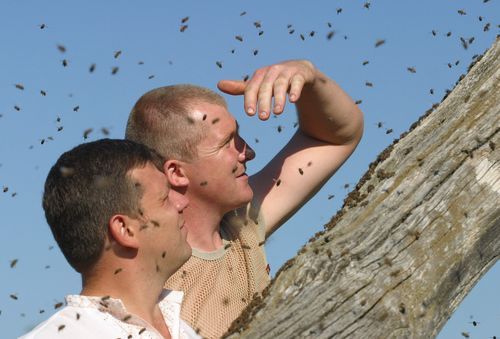A bee “hotel,” doubling as an education center for humans
Scientists have built a “family home” for the insects in the Charivna Havan National Park on the Tarkhankut Peninsula
“There are hotels for people, but we can also establish hotels for insects, as other creatures require certain conditions to thrive just as humans. The hotel is a structure providing bees with a place to nest,” Serhii Ivanov, entomology professor at the Taurida Vernadsky National University told us.
“Places suitable for wild bees’ nests are in fact quite scarce in the nature. Therefore, they sometimes establish really large colonies when they find such a place. They mostly nest on the ground, but most of them readily colonize dry stalks of plants, too. Previously, these bees often lived in thatched roofs. Now they have fewer opportunities to nest, and humans get less of a chance to watch them. Finding even one bees’ nest is a great achievement for a scientist. Thus, we resolved to build a ‘hotel’ for them. Few people know that the Crimea is home to over 500 species of bees. Bringing at least some of them together in one place is a very interesting task,” Ivanov said.
The professor noted that the Taurida Vernadsky National University has long been serving as a “mini-hotel,” housing 15 bee species. In fact, it was the university bees that became the first inhabitants of the Tarkhankut “hotel.”
Objectives of the “insect hotel” project include more than just improving their “living conditions,” as the establishment will also serve as an environmental education center for humans, and such education is an essential task, as we have learned from experience. Insects are constantly subject to conscious and unconscious human influences, there are multiple cases of destruction of individuals and entire nests of wasps and bees. The recent incident of vandalism occurred this year in the Charivna Havan National Park, where an “insect hotel” was intentionally burned down, destroying an establishment specially built, installed, and populated by bees and wasps to support local populations of these insects, as well as to provide environmental education to tourists. Researchers Fateryha, Ivanov, Stukaliuk, and Zhydkov covered the event in their presentation at the 7th International Theoretical and Practical Conference “Crimean Reserves.”
One can have the best bee experience in spring or early summer. “Everything dries up by August. It is a little disappointing, because most tourists come to the Crimea exactly in August, but we will do our best to find the species that nest in this month. By the way, there are no special requirements for visiting ‘hotels,’ one can just come close and look at them. But people differ in their responses, some are definitely unhappy with a bee landing on their hand, a person may even begin to panic. Here, again, the environmental education’s role is crucial,” Ivanov said.






